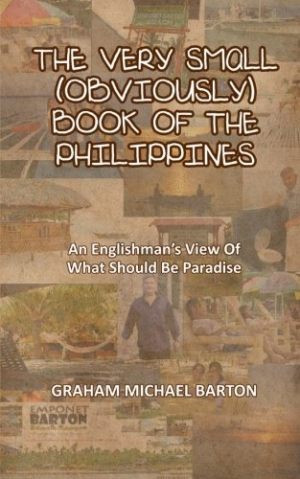The Very Small (Obviously) Book of the Philippines
An Englishman's View of What Should be Paradise
Barton ignores his inner censor and allows blunt honesty to grace the pages of his entertaining memoir.
This quick literary trip will amuse and confound anyone unfamiliar with the distinctive cultural makeup of the exotic Philippines. A precarious cross between insult and perception, Graham Michael Barton reveals his private album of memories, like a mischievous traveler exposing the bad as well as the good, in The Very Small (Obviously) Book of the Philippines. This tourist-turned-resident immerses himself in the culture, sampling the tastes and the habits and then selectively rejecting what does not appeal to his British view of the world.
Ethnocentric yet hilarious, Barton ignores his inner censor and allows blunt honesty to grace the pages of his entertaining memoir. Told in vignettes—snippets from a scrapbook of experiences—ugly descriptions mingle with gentle, and sometimes not-so-gentle, humor. The book’s greatest achievement is its candid appraisal, which may disclose more about the author than the Philippines, as its pages convey the personality of the intelligent man who wrote each word.
This work’s primary flaw is a tendency to patronize and poke fun at people who have not comprehended a situation or refused to acknowledge another way of thinking. This condescending approach may garner a few detractors, yet some will empathize with Barton.
A lingering colonial mentality permeates these offensive scenarios, leading one to believe that what appears to be “backward” needs “development,” alienating those who wish to leave cultural traditions as they are: “Finally, don’t forget the superstition and magic needed to complete almost every task. Stones must be blessed by the sun, mud must be smeared on the outside of the well, and various other bizarre rituals must be performed.” Barton goes on to write, “These rituals are not only religious, they are primeval.” This type of statement implies an air of superiority.
Barton, however, cannot be blamed for pointing out obvious shortcomings apparent to anyone who visits the Philippines: “I should have touched upon the evil, almost always suicidal drivers whom, I swear, are the Devil’s spawn of Japanese kamikaze pilots. Teeth bared, hands clenched to the wheel, laughing maniacally, they throw the sardine-packed passengers about in the specially designed Toyota vans.”
This unique autobiography, lacking in sufficient editing, must be taken within the context in which it was written. The goal is likely to inform and enlighten. Highly personalized packaging depicts the author in a grainy sepia photo with a blurb that tempts one to visit the Philippines.
Graham Michael Barton and his business partner own the Emponet Barton Beach Resort on Higatangan, a tiny island in the Philippines. His love-hate relationship with this beautiful country is evident on every detailed page of this debut. He depicts his adopted home as a vibrant place that aspires to be paradise but falls short of achieving utopia.
Reviewed by
Julia Ann Charpentier
Disclosure: This article is not an endorsement, but a review. The publisher of this book provided free copies of the book and paid a small fee to have their book reviewed by a professional reviewer. Foreword Reviews and Clarion Reviews make no guarantee that the publisher will receive a positive review. Foreword Magazine, Inc. is disclosing this in accordance with the Federal Trade Commission’s 16 CFR, Part 255.

